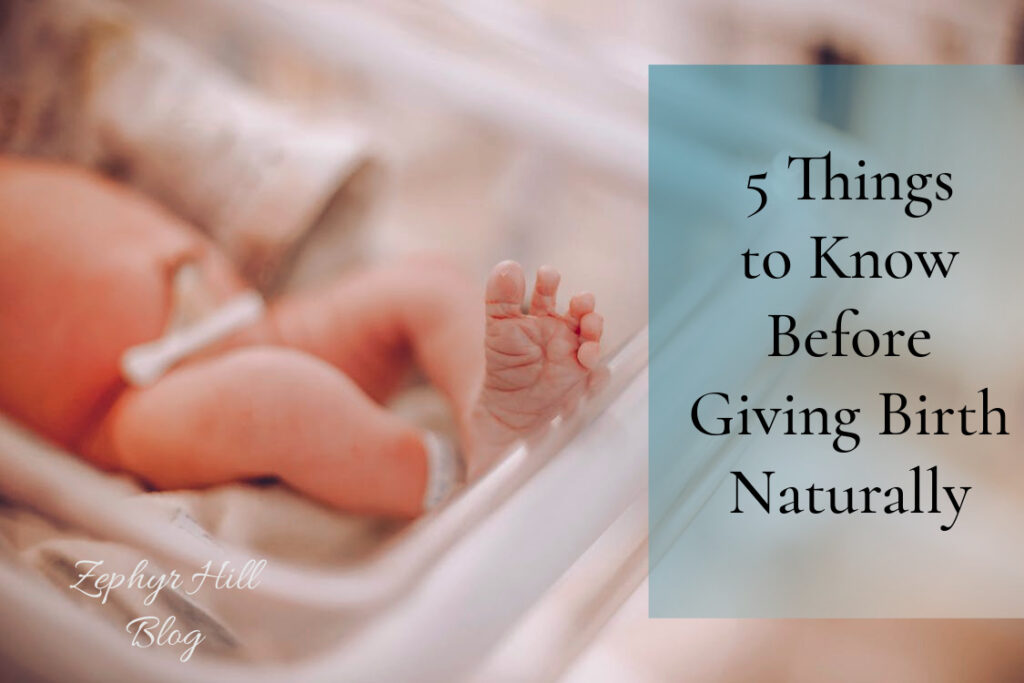
Today’s post is all about preparing for a natural (i.e. unmedicated) birth. If you’re looking for facts about epidurals, check out this article.
Birth without drugs is painful, to varying degrees. I guess we’ve all heard about painless births but they must be very rare exceptions. So it helps to have a good idea of what to expect so you can have coping techniques on tap.
Changes in behavior and moods. I can’t say how you’ll act, but I do know that the pain, stress and hormones of natural labor can make a woman do and say things that are not typical. Labor affects both body and mind. But the medical staff has probably seen it all, so don’t worry on that account.
Constant checks are not necessary. Being checked for “progress” while you’re having a horrible contraction is awful, so feel free to decline the constant surveillance. Barring emergency situations, there are other signs that an experienced doctor or midwife can use to gauge how labor is going.
Besides, each intrusion introduces the possibility of contamination. A good provider will ask first if he can do a check, with the understanding being that a mother can say yes or no.
Dramatic changes at the end. Most women can sense that something different happens around transition. Contractions get closer (you can barely rest in between), and pain levels intensify. Low backache is very common. Some mothers feel sick or experience mood changes (desperation, mental exhaustion). While God designed the first stage of labor to progress more gradually, things really intensify in this time just prior to delivery.
Up until this point, you might have felt like you were “in the zone” and coping quite well. And then transition hits. Your birth class didn’t quite prepare you for this. They used words like “discomfort” and “pressure” when in fact you feel like you’re going to split in two.
All I can say is labor sure has kept me humble over the years. I’ve cried like a baby. Yelled in frustration and anger. Begged for drugs.
But now that I know what’s coming, I can prepare myself psychologically for it. I can go into labor knowing full well that all the techniques that worked before might fail me at the end. As opposed to panicking and thinking something is wrong. This is the time to pray hard and do everything you can to see past the pain and imagine a beautiful new baby in your arms. Lean heavily on your doctor or midwife (and support person, if you have one) and follow their coaching as best you can.
In a morbid sort of way I have come to welcome these last pains because they are a light at the end of a tunnel of nine long months of suffering and waiting.
Getting the baby out more effectively. Being in pain makes you naturally want to arch your back. DON’T. Especially in the pushing phase. Curling inward can work amazingly well to move a baby down and out. My midwife has to repeat this to me over and over while I’m pushing, because I tense and straighten with the contractions.
Be prepared for afterpains. All the pain seems to momentarily vanish as your squalling newborn is held aloft for all to see. But there are just a few more routine unpleasantries you need to be aware of. Delivery of the placenta happens shortly after birth, usually within 20 minutes, and it can be painful. Getting stitched up (if you tore) can also be mighty uncomfortable, but some local anesthesia can help. If you nurse right away after an unmedicated birth, the afterpains feel like menstrual cramps (ouch!). The more babies I’ve had, the more afterpains hurt (I know, tough breaks, ladies!).
For me, though, having the baby I’ve waited nine months to see cradled in my arms is like a balm that helps to lessen the pain of these after-birth inconveniences. That beautiful little soul provides plenty of distraction.
I usually take some kind of pain relief shortly after labor because of the inevitable comforts that following during recovery. Natural is always best, especially if you’re going to be nursing your child.
Have you experienced natural childbirth, or do you hope to? What advice would you give to an expectant mother?

Great article, Anne! I appreciate your honesty and your positive outlook on birth. It seems like candid viewpoints tend to have a heavy focus on the negative… I enjoyed reading about your experiences! 🙂
Thanks, Robin! Sometimes it can be tricky trying to strike a balance. ~Anne
Congratulations on your upcoming baby!!! Thanks for posting these topics. I had a natural childbirth, and for me the most important thing was teaching myself to relax and breathe. I practiced for months in advance because I am not a relaxed person!! The practice paid off because by labor time, the skills were second nature. I used Hypnobirthing ideas. I don’t think I hypnotized myself, but I do believe that my peaceful state of mind helped me get through water breaking early, surprise back labor, and all the things you mentioned above.
Also, being free to move into the positions that were most comfortable for me was essential.
Coleen, that’s a big one for me, too. It’s easy for me to let anxiety take over. I think it’s wise you let your mind go through the whole thing in advance instead of letting it all build up in one day. Freedom of movement is hugely important to me as well! ~Anne
We are hoping for a natural birth and are trying to diligently prepare. This is helpful. I need to know to expect the unexpected. It’s not going to be by the book but at least I’ll have a few different ways to manage pain and such. I’m just afraid that I’ll forget everything!
Bri, I’ll be doing one more post in the series and that’s about the purpose of labor pain and how you can use it to your advantage. Don’t worry about forgetting anything because you will find that lots of instincts will kick in for you. A good coach helps keep you focused, too. ~Anne
The advice I would give is expect the unexpected! I had a natural birth with my son, and had done tons of preparations, but had a very atypical birthing experience. I went from basically no contractions to transition in an hour. I didn’t realize I was in transition because it didn’t seem possible, but looking back at it all the signs were there. The only thing that was off was that my contractions weren’t “long enough.” But then, they never got “long enough” and my baby was born just 4 hours after I started feeling contractions. We barely got to the hospital in time (baby was born 10 minutes after arriving) and needless to say neither our doula or doctor made it either. It was completely unexpected and a shock to the system, but I got the natural delivery I wanted 🙂
Leela, your story is SO valuable for other mothers to read, so thank you for posting it here. Every once in a while there’s a birth that just don’t follow the typical pattern. I’ll share a few more of these in my final post of the serious – on the purpose of labor pain. So glad you got your natural delivery! ~Anne
Great post! I’ve had three babies with an epidural and two with nothing. We are expecting our 6th in October. I have people ask me if I’m going to do it all natural again. My honest answer, I would love to, but every birth is so different that I can’t be certain. I’ll comment on a couple of points you brought up. It can change your behavior. Yes, I go from talking non-stop (to keep my mind off the pain) to being totally silent. My husband says he always knows transition is coming because I quit talking. It can get intense at the end. Four out of my five births have included me getting sick. A lot. During hard contractions. While trying to push. Which only adds to the intensity. I won’t lie, it’s awful. I have had two nurses tell me it’s pretty common though (I wonder if they just said that to make me feel better!). I have looked at my husband and said, “I think I’m going to die if I have another contraction.” and “I can’t do this. I have to stop.” So yes, you get a little crazy. But alas, I didn’t die and I kept pushing and made it through! I agree with you on the burning during crowning. To me, that’s when I get this burst of energy knowing I will soon see my little one! Thank you for sharing both sides and being honest. I’ve really enjoyed this series. Congratulations on your soon to be here little one!
Kimberly, from what moms are telling me the getting sick thing seems to be an unfortunate result of both epidurals and natural labor. I do feel a bit queasy close to transition, but have never actually been sick. You have my sympathies! And thanks for the well wishes and for following the series. There will be one more – on the purpose of labor pain (next week). ~Anne
Love reading ur posts on birth… I had the epidural with my first. Never really had a plan one way or another and I am glad I had it with him as he was posterior and my doctor was able to reach in and turn him for delivery… Not sure I could have handled that without the epidural. With my second I toyed with the idea of natural birth. I never really decided. In the end she can fast! First contraction at 10 am water broke at 2 got to the hospital at 2:30 and born at 3pm. I asked for drugs of any sort for the pain and was told baby is coming, no way your getting anything. I didn’t think I could do it. She would have been there 5 min after we arrived but she was stuck on my epesiatomy scar (which wouldn’t stretch or tear – which my doc said it usually does, tear that is, right along the scar) she eventually came out not breathing and was whisked away to the nicu… After her birth I swore I would never do natural again b/c it was awful. But the recovery was so great with her. Now with #3 on the way I am thinking maybe natural is the way to go after all. Now that the experience and pain is not so fresh in my mind I am really thinking of going natural again.. I look forward to reading ur other posts on natural birth.